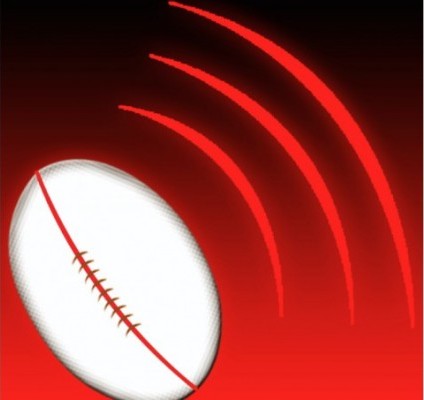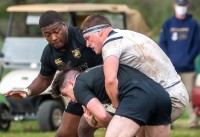Army-Navy Debrief: Army Solid, Navy Soul-Searches
Army-Navy Debrief: Army Solid, Navy Soul-Searches
As you may have seen in GRR’s preview of this past Saturday’s Army-Navy men’s rugby game, the matchup has a history of being close—just not this time.
Since 2010 the meeting of West Point and the US Naval Academy has seen eight games decided by a try or less. This Halloween’s emphatic 39-13 win for Army was the largest victory in recent memory. Why? Navy Head Coach Gavin Hickie has some thoughts.
“We’re not hiding from it,” Hickie told GRR. “We were just very poor; we didn’t play like we planned on playing.”
Hickie got more specific:
“Our physicality was nowhere near where it needed to be, it pains me to say. Our decision-making wasn’t good enough, our tackling wasn’t good enough, our organization on our defensive line wasn’t good enough, and we certainly weren’t good enough in the set piece.”
OK, that about covers it.
At West Point, the feeling is a bit more upbeat.
“I thought overall it was a good performance for a first game,” said Army Head Coach Matt Sherman. “Our set pieces were very good—I was very happy with both the lineout and the scrum. But I think additionally I was very happy with how we finished out opportunities when we were attacking, and in our own end we didn’t let them finish theirs.”
At the crux of it, if you combine the physicality aspect, the set piece, and then add pressure, you’ll see why Army came away with tries and Navy came away with a couple of penalties, and only one try.
Using the scrum as an attacking platform, Army was able to launch quickly and effectively, scoring their first two tries in pretty much the same way— scrum, drive off the base, quick pass out to a charging forward who got over.
Errors Fueled Army Charge
For Navy, though, those tries were also the result of mistakes by the Midshipmen.
A missed kick to touch on a penalty allowed Army to counter and eventually score. A dropped ball produced a scrum that also led to an Army try. And then a dropped ball off a missed penalty goal set up another attacking scrum and an Army try.
“If we don’t give them those opportunities then we’re not in a hole early on, and they don’t have their tails up,” said Hickie. “If you want to be one of the best teams in the country you can’t be giving anybody 19 points.”
Conversely, Army didn’t make those mistakes. They absorbed a lot of pressure, especially in the second half, and held firm.
“We would not be happy how we managed the territory of the game in the middle 40 of the game,” said Sherman. “We were in position of defending more than we were attacking. But we always work on our defense and we were just pleased we were able to keep them out.”
West Point Help Themselves
Notable in that first half was Nolan Green’s try when he raced in off his right wing to chase down a kick on the left wing for a try. Sherman called his vice captain “Mr. Hustle,” and added that Green “never takes a shortcut; he’s a great example of continuing to look for work at every opportunity.”
Hickie acknowledged that that try was down to West Point’s ability.
“That was the try they worked the hardest for,” he said.
That try also turned a tight 19-13 game into a 24-13 halftime lead that seemed to put Army in command.
Next Up ... Same Thing
Now … guess what? We get to do this all over again in two weeks. Navy will be making some significant changes, both in game plan and personnel. The Midshipmen will likely make some lineup changes based on performance, but also will bring a couple of others back from injury.
“We’ll own it,” said Hickie. “That was us, but we’ll come back from it. We’re stung, to be sure, but we now know where this team needs to be.”
Having said all that, there was still an air of positivity. After all, they were playing a rugby game.
“What a breath of fresh air to be able to play some sports,” said Hickie. Added Sherman, “It was just phenomenal to get a game
with present trends. The challenges are still there, but hope to get this second opportunity.”

















